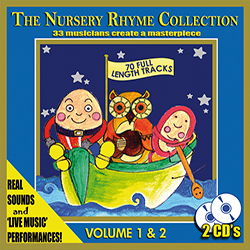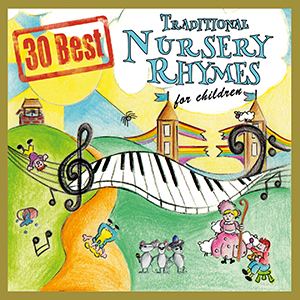The Nursery Rhymes Collections 1-4 contain a total of 277 children's songs. Each double CD album showcases the highest quality children's music ever recorded with a total playing time in excess of 10 hours!
Little Tommy Tucker (Full Audio and Lyrics)
Little Tommy Tucker
He sang for his supper,
What did he sing for?
But white bread and butter.
How can he cut it without any knife?
How can he marry without any wife?
Words & Music: Traditional
Arrangement: Ian J Watts/Mike Wilbury
Origin and background
As we already mentioned when discussing the origin of See Saw Margery Daw many historic nursery rhymes deal with child labour. Little Tommy Tucker is one of these poor working children. Although no reliable source could be found for that, it is a widely accepted idea that Tommy Tucker was a name given to orphans. It is also true, that the economic and social situation of orphans was very difficult. There are a lot of sources about this! What can’t be true is:
What did he sing for but
white bread and butter.
because white bread was a luxury good in the 18th century.
White bread was therefore a rarity and a luxury. "In all French, Spanish and English homes," wrote Dupré de Saint-Maur, "there are not more than two million men eating wheathen bread." If the statement is accurate it would mean that no more than 4 % of the European population ate white bread. Even at the beginning of the eighteenth century, half the rural population fed on non-bread-making cereals and rye, and a lot of bran was left in the mixture of grains that went to make bread for the poor.
(Source: Fernand Braudel, Civilization & Capitalism in the 15 - 18th century, page 137)
The same thing applies for butter. Therefore should we suppose, that this verse is a form of evil mockery. White bread and butter was completely out of reach for Tommy Tucker.
The verse
he sings for his supper
is obviously a simplification of a much more complex situation. It was much more common for children to work in coal mines, cotton mills, potteries etc. We understand the conditions that children worked in due to a series of Factory Acts from 1833 onwards, laws passed to reduce child labour. Children younger than nine were no longer allowed to work and children older than nine were "only" allowed to work 9 -12 hours a day (reduced even more in 1844). They earned between 10 – 20% of an adults wage. If the law established 12 hours as a maximum it can be easily deduced how many hours children had worked before. Tommy Tucker didn’t sing for his supper, he worked for it under very difficult circumstances!
How can he cut it without any knife?
How can he marry without any wife?
Little Tommy Tucker couldn't afford bread and he couldn't even afford a knife to cut it. “…How can he marry without any wife?...“ refers to the fact that the social status of orphans was very low. There is no evidence given for the affirmation that it was therefore difficult for them to find a wife and it doesn’t seem to be very logical either. It is to be supposed that there were orphans of both sex. Perhaps it was difficult for them to bring up a family for lack of the necessary economic resources.
These figures presented by the BBC are not what one would call a “scientific approach“, because no source is given, but perhaps there is some truth in this data.
Mortality rates were extremely high: over 74% of children born in London died before they were five. In workhouses the death rate increased to over 90%.
Source: http://www.bbc.co.uk/history/british/victorians/foundling_01.shtml
The sardonic tone of the song is perhaps due to the fact that poor people where scorned in the 17th / 18th century for social, religious and economic reasons.


